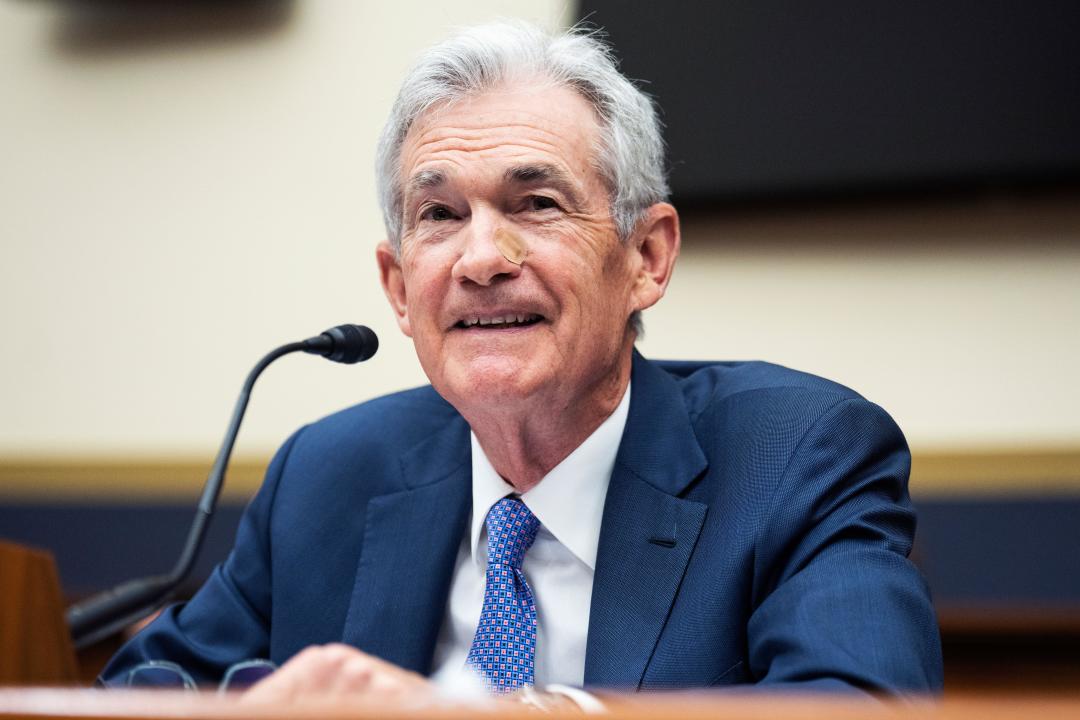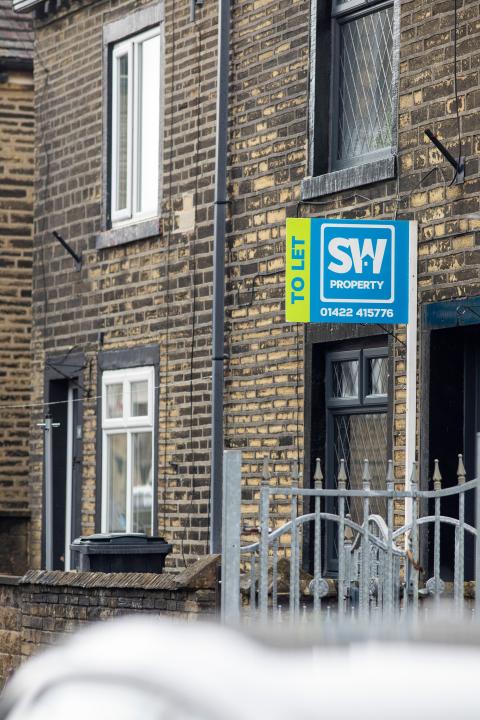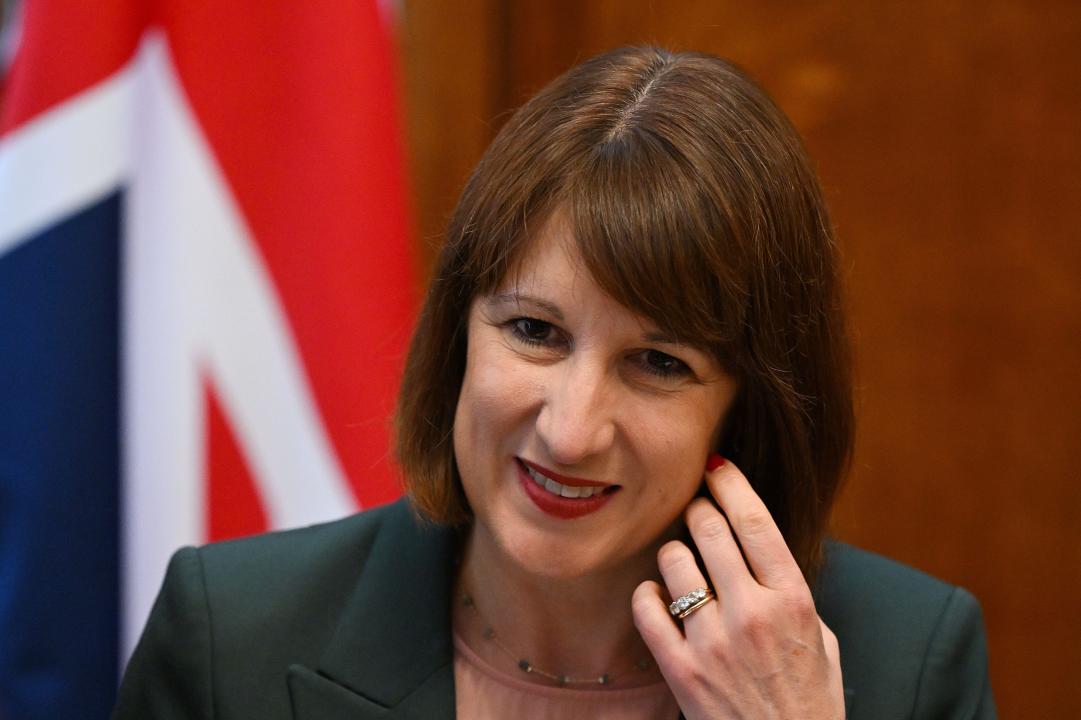The FTSE 100 (^FTSE) and European stocks pushed higher on Thursday as the UK economy grew by 0.4% in May. According to figures from the Office for National Statistics (ONS), gross domestic product (GDP) managed to bounce back from a wet weather hit the month before.
City economists had forecast growth of 0.2%. The expansion was led by the services sector, which grew 0.3%. Production rose 0.2%, while construction rose 1.9%. It comes after zero growth in April when the weather hit consumer spending on the high street.
The pound rose on the back of the news to its highest level against the dollar since early March, hitting $1.287 on Thursday morning.
Across the pond, stocks on Wall Street opened mixed as US inflation fell faster than expected in June, boosting hopes of a rate cut from the US Federal Reserve.
The Consumer Prices Index fell to 3% last month, down from 3.3% in May. This was better than expected, with markets initially forecasting figures to come in at 3.1% for the month.
Analysts now expect the lower reading will force the US central bank to cut interest rates faster than expected.
Read more: Trending tickers: Apple, Tata Consultancy Services, Costco and Dr Martens
Russ Mould, investment director at AJ Bell, said: “A stronger pound has traditionally been unfavourable for the FTSE 100 given many of its constituents earn in US dollars. That factor was given a backseat as utilities, miners and big consumer brand companies, including Diageo and Unilever, helped to push the index higher.”
Follow along for live updates throughout the day:
Live23 updates
-
Euro 2024 final to add £405m to UK economy
England fans could provide a £405m boost to the British economy ahead of Sunday’s Euro 2024 final between the Three Lions and Spain
This is according to the Men’s UEFA Euro 2024 Spending Report by VoucherCodes.co.uk. It revealed that 11 million Brits will watch the big match at their local pub, bar, or restaurant spending as much as £124.9m.
Other key stats include:
-
Some 17.2 million pints will be poured on Sunday
-
19.5 million fans will watch from home, splashing out £202.5m on food and drink alone
-
Retailers will earn a £280.1m boost in total sales ahead of the big match
-
In total, the Euro 2024 tournament has provided the UK economy with a £3.1bn boost
Anita Naik, savings expert at VoucherCodes.co.uk said:
“Sunday is set to be a defining moment for the country as The Three Lions take to the pitch in a bid to end their 58-year wait of lifting a major trophy. Despite Spain being the favourites to take the win, our data shows the nation has been rooting for the team every step of the way, showing their support through their wallets as well as their cheers.
“Whether you’re watching the game from your sofa or from your local, head to VoucherCodes.co.uk to secure an array of discounts on food, drink and sportswear. Keep the crowd well-fed with an exclusive 50% off pizza orders overs £25 at Domino’s, or if you’re watching from home, get 30% off your first grocery order over £80 with Ocado – all our codes are hand-tested to make sure you always get the saving you’ve been promised.”
-
-
US jobless figures dipped
More from the US…
The number of new jobless claims fell by 17,000 to 222,000 for the week ended 6 July and continuing claims held stable, new figures have shown.
The Labour Department said on Thursday that this was the lowest level since late May. Economists polled by Reuters had forecast 236,000 claims in the latest week.
However, the claims data included the Independence Day holiday. Claims tend to be volatile around holidays, and auto makers typically shut down assembly plants starting the July 4 week to retool for new models.
There were 1.22 job openings for every unemployed person in May, not much higher than the 1.19 average in 2019.
The unemployment rate rose to a 2-1/2-year high of 4.1% in June from 4.0% in May. Claims have since June been stuck in the upper end of their 194,000-243,000 range of this year.
-
Best UK mortgage deals of the week
Mortgage rates eased slightly amid hopes of an interest rate cut in August, but prospective homeowners are still struggling to find a deal they can afford, with more taking loans well into retirement.
The average rate on a two-year fixed deal this week stood at 5.99%, same as last week, while rates for a five-year deal came in at 5.45%, lower last week’s 5.49%, according to figures from Uswitch.
The Bank of England (BoE) has left UK interest rates on hold at a 16-year high of 5.25% for a seventh consecutive time but markets are hoping for an August cut.
With fewer BoE interest-rate cuts now expected in 2024 and with an impending announcement on interest rates, many of the big lenders kept their offers unchanged.
“This week we’ve seen lenders respond to their growing expectation of a bank rate cut in August, and likely the election results, with a host of rate cuts across two- and five-year products,” Kellie Steed, Uswitch’s mortgage expert, told Yahoo Finance UK.
“While these have not been significant enough yet to influence the overall average rates, we can see that across the big six lenders, the average two-year fixed rate has fallen by just over one percentage point and the average five-year fixed deal by 0.08%.
“As the month progresses we’re likely to see more lenders follow suit, with Nationwide and Skipton both announcing cuts as high as 0.3% and 0.33% respectively to both their residential purchase and remortgage ranges today,” she added.
-
Commentary on US inflation dip
Lindsay James, investment strategist at Quilter Investors:
“This has been one of the most hotly anticipated inflation prints for some time in the US as markets eye up a rate cut in September.
“This should, all other data providing, give the Fed enough of a pathway to cut rates in a couple of months’ time and start the US on a similar trajectory to Europe and, if they cut too, the UK.
“Like in other developed markets, services inflation continues to run a little hotter than many would like, but we are seeing goods inflation coming back down enough to offset this and bring the overall level of inflation down.
-
US inflation fall leaves pathway to early rate cut


UNITED STATES – JULY 10: Federal Reserve Chairman Jerome Powell testifies during the House Financial Services Committee hearing titled (Tom Williams, Associated Press) US inflation fell faster than expected in June, boosting hopes of a rate cut from the US Federal Reserve.
The Consumer Prices Index fell to 3% last month, down from 3.3% in May, new figures have shown.
This was better than expected, with markets initially forecasting figures to come in at 3.1% for the month.
Analysts now expect the lower reading will force the US central bank to cut interest rates faster than expected.
Fed chair Jerome Powell recently said he did not think inflation had been beaten and that “more good data” would be need to boost the case for a rate cut.
Traders are hoping for a possible rate cut in September.
-
Economic impact of England reaching Euros final
England has reached the finals of the Euros and HR departments are likely to experience several impacts.
There will likely be a surge in leave requests as employees seek to take time off to watch the match or recover from celebrations.
This could include requests for annual leave, half days or even last-minute sick leave, known as the post-match recovery.
Dr Tony Syme, senior lecturer in economics and head of the finance and economics subject group, University of Salford Business School, said:
“Sporting success brings tangible economic benefits. A pre-tournament survey conducted by GlobalData predicted that spending in the UK would increase by £2.75bn during the four weeks, with half expected to go towards food and drink.
“And that effect has become more pronounced as England has reached the knockout stages and their performances have improved. Around 40% of pubs extended licensing hours for England’s semi-final against the Netherlands and supermarkets have reported alcohol and associated food sales to be brisk.
“Beyond the immediate spending effects of sporting success, there are economic benefits around the feel-good effects. Mood, motivation and productivity in the workplace have all been found to rise following sporting success. And it can also have a cohesive effect in terms of culture and national pride.
“But don’t expect the effects to be long-lasting. The economy slowed and even went into downturn in the six months following England’s World Cup success. A similar slowing of economic growth followed England reaching the World Cup semi-final in 2018 and the Euro 2020 final in 2021. As in politics, a week is a long time in sport.”
-
Is bitcoin heading for a bear market?
Bitcoin (BTC-USD) was trading within a narrow 24-hour price range of $57,200 to $58,200 on Thursday.
Chart indicators suggest that the cryptocurrency is in a precarious position, which could either lead to further declines or stabilisation, followed by gradual appreciation.
Bitcoin rebounded from a low of around $54,600 at the start of the week, to trade at around $58,120.
Bitcoin’s price has steadily declined from $71,000 since the beginning of June.
Multiple sell-pressure factors over the past weeks has caused a spike in price volatility. Some traders fear a potential increase in the digital asset’s supply hitting the market, originating from seized bitcoins held by the German and US governments, according to this week’s CryptoQuant market report.
Further sell-side pressure could come from the distribution of funds from the defunct bitcoin exchange Mt Gox.
-
Costco shares rise amid membership fee increase
Shares in the membership-based bulk retailer Costco (COST) were higher in pre-market trading as it announced fees would go up for the first time since 2017.
Starting 1 September, fees will increase to $65 for individuals and $130 for executive memberships, up from $60 and $120, representing an 8% hike for both categories. Costco said the rise will hit 52 million memberships.
Around half the 74.5 million households that hold cards are executive members who pay the higher annual cost. This membership includes 2% cash back on in-store and online purchases.
The company posted net income of $1.68bn in the 12-week period ending 12 May. That figure incorporates the $1.12bn in membership fees it took in during the quarter. Costco earned nearly $4.bn in annual membership fees in the fiscal year that ended in early September, an 8% increase from the previous year.
Sales for the five weeks ending on 8 July rose 7.4% from the same period last year to $24.48bn, taking the year-to-date tally to $210.55bn — a 6.9% increase from last year.
-
Wood Group results points to likely Dubai takeover
Wood Group has published its half-year results, increasing the likelihood of a deal that could see it taken over by Dubai-based Sidara.
The Aberdeen-based engineering group has rebuffed three offers from Sidara, formerly known as Dar Al-Handasah.
It comes after the company suffered a downgrade by Barclays yesterday with warnings that its share price would fall sharply if the bid failed.
Sidara has proposed an indicative offer of £1.6bn and has until 31 July to make a firm bid for the group.
Wood’s adjusted earnings rose 4% to $210m (£163m) and its profits margins also improved, it said.
-
Why gold is the best investment amid volatility
As market volatility (^VIX) continues to weigh on investors’ minds, John Petrides of Tocqueville Asset Management shares his investment insights amid the Federal Reserve’s interest rate decision making on today’s episode of Catalysts
Petrides observes that volatility has been “strangely quiet” recently, a situation that appears to have made the Federal Reserve more attentive to market reactions. In light of this environment, Petrides advises investors to buy gold (GC=F), arguing that “there’s way too much uncertainty” in the current market, making gold an attractive option for investors.
Furthermore, with potential Fed rate cuts on the horizon, Petrides believes gold stands to benefit.
For more expert insight and the latest market action, click here to watch this full episode of Catalysts.
-
Moonpig shares slump 3%
Moonpig (MOON.L) shares slid in London after a group of investors sold 35 million shares in the company in a placing via Citi, JPMorgan and Jefferies, raising proceeds of approximately £61m.
According to terms seen by Bloomberg, Exponent Private Equity, Lexington Partners, Blackstone Group, LGT Capital Partners, GoldPoint, Kaust Investment Management Co, Storebrand International Private Equity & Patria Investments were all involved in the sales.
The sale represents around 10.2% of Moonpig’s issued share capital and the sale price of 175p is a discount of 13.4% to the closing share price on Wednesday.
-
Tesco to close thousands of stores early as England play Euro 2024 final


England’s manager Gareth Southgate celebrates at the end of a semifinal against Netherlands at the Euro 2024 soccer tournament in Dortmund, Germany, Wednesday, July 10, 2024. England won the game 2-1. (AP Photo/Thanassis Stavrakis) (Thanassis Stavrakis, Associated Press) Tesco’s (TSCO.L) Express stores in England will close early on Sunday to allow employees to watch the Euro 2024 final, following England’s triumph over the Netherlands in the semi-final.
The UK’s largest supermarket chain revealed that more than 1,800 Express stores will shut at 7:30pm, rather than the usual 10pm or 11pm.
This decision will allow thousands of Tesco employees to either head home or join friends at local pubs to witness the Three Lions face-off against Spain in Berlin. The match is scheduled for 8pm on Sunday, marking a significant moment as the England men’s team vies for their first major tournament victory since the 1966 World Cup.
Tesco has assured its staff that they will receive their regular pay for the hours lost due to the early closure. Employees who choose not to watch the match will also be compensated as usual. The retailer’s larger stores in England, which typically close earlier on Sundays, will not be affected by this change and will reopen the following morning at their regular hours, typically between 6am and 7am.
Kevin Tindall, managing director of UK stores at Tesco, said ahead of the semi-finals:
“We appreciate just how much this would mean to so many of our colleagues, and we want them to be able to celebrate with their family and friends.”
“So, if we make it through to the final, we will close our stores across England in time for them to get behind Gareth Southgate and the team, and we’ll all be hoping that football will be coming home.”
Tesco reassured customers that its stores would remain open as usual during the day on Sunday, allowing ample time for pre-match shopping. Additionally, all online orders scheduled for Sunday evening will be fulfilled as planned. Stores in Wales, Scotland, and Northern Ireland will continue to operate according to their regular hours.
-
Pound hits four-month high after GDP data
The pound has climbed to its highest level against the dollar since early March this morning, hitting $1.2879.
It comes after figures showed the UK economy grew faster than expected in May, tempering hopes of an August rate cut from the Bank of England.
Traders are also looking ahead to US inflation figures later today.
Russ Mould, investment director at AJ Bell, said:
“The new government has placed economic growth at the heart of its policies and it will be pleased to have inherited positive momentum with GDP.
“The bigger issue is whether the Bank of England will look at this data and feel less inclined to cut rates. After all, cutting rates is something a central bank does to stimulate a lacklustre economy, not grease the wheels for one already moving ahead.
“That said, momentum could easily lose pace, particularly if the jobs market weakens and sticky inflation causes consumers to stay cautious on spending.
“A stronger pound has traditionally been unfavourable for the FTSE 100 given many of its constituents earn in US dollars. That factor was given a backseat as utilities, miners and big consumer brand companies including Diageo and Unilever helped to push the index higher.”
-
UK property market set to rebound
UK house sales should get a boost over the next three months amid hopes that mortgage rates will soon begin to fall, according to a survey.
A net balance of 20% of professionals expect to see a recovery in home sales over the next three months, marking the highest level of sales expectations since January 2022, the Royal Institution of Chartered Surveyors (Rics) said.
Economists have predicted that the base rate could be chopped from its 16-year high of 5.25% to 5% at the next vote on August 1. In response, the UK’s biggest banks have been cutting mortgage rates in recent days, providing some relief to homeowners and prospective buyers.
The newly elected Labour government has voiced a strong commitment to boosting the housing market, aiming to deliver 1.5 million homes over the next five years, a figure not hit since the 1960s.
A balance of 54% of professionals in the survey expect house prices to be higher in a year’s time, which Rics said highlights a key challenge for the new government, as boosting the supply of homes “will not be an easy task”.
Tarrant Parsons, Rics senior economist, said:
“Although activity across the housing market remained subdued last month, forward looking aspects did improve slightly.
“There are some factors emerging now that could support a recovery in the months ahead.
“If the Bank of England does decide that the current inflation backdrop is benign enough to start loosening monetary policy next month, this may prompt a further softening in lending rates.
“In addition, the recent election delivered a clear outcome, with housing pushed up the political agenda.”
-
Dr Martens shares kick higher


Rome, Italy, 6th Jul, 2024. The summer sales season has just begun in Rome and in most Italian regions. Shops in the historic center of Rome. Credit: Brad Sterling/Alamy Live News (Brad Sterling) Dr Martens’ (DOCS.L) shares rose as much as 4.6% on Thursday, before pulling back, after it revealed trading for the first quarter was in line with expectations.
It comes as the first three months are typically quieter for the bootmaker due to the end of the spring and summer season, when business generally booms.
The company added that the upcoming autumn and winter period would be a “key focus” and that results would be heavily weighted to the second half.
-
Total average proposed bills in 2029-30
Here’s a breakdown of the bill hikes as mentioned below…
Water and wastewater companies:
-
Anglian Water: £557 – up 13% from current prices
-
Dŵr Cymru: £603 – up 29%
-
Hafren Dyfrdwy: £524 – up 32%
-
Northumbrian Water: £460 – up 11%
-
Severn Trent Water: £496 – up 23%
-
Southern Water: £603 – up 44%
-
South West Water: £561 – up 13%
-
Thames Water: £535 – up 23%
-
United Utilities: £536 – up 21%
-
Wessex Water: £497 – down 2%
-
Yorkshire Water: £537 – up 25%
Water only companies:
-
Affinity Water: £203 – up 6%
-
Portsmouth Water: £135 – up 18%
-
South East Water: £248 – up 8%
-
South Staffs Water: £183 – up 14%
-
SES Water: £187 – down 15%
Gary Carter, GMB national officer said:
“Ofwat is right that water companies should fork out to clean up the mess they’ve made – not customers
“But that can’t be at the expense of water workers’ terms and conditions – which are the first things to be cut when companies plead poverty.
“Shareholders have trousered fortunes from UK water – they must be the ones to stump up the investment the money industry so desperately needs.”
-
-
Water bills set to rise by £19 a year
Water bills in England and Wales are set to rise by an average £19 per year until 2030, industry regulator Ofwat has revealed. The rise is a third less than the amount requested by water firms.
It comes as suppliers face rising scrutiny over their environmental and financial performance over the past years, as well as anger over executive pay.
The hike is aimed at funding investment for improvements such as replacing leaking pipes and reducing sewage discharges into rivers and seas.
Thames Water customers face an increase of £99 or 23% over the next five years, with Anglian customers seeing a rise of £66 or 13%, and Southern Water £183, an increase of 44%.
-
More tenants looked to rent in Q2


House to let sign on a home in Northowram near Halifax, West Yorkshire , UK as the cost of private renting reaches record highs.Credit: Windmill Images/Alamy Live News (Windmill Images) The latest research by tenancy deposit alternative Zero Deposit has revealed that tenant demand for rental homes climbed by 1.5% between Q1 and Q2 this year. However, demand remains 2.3% lower than this time last year.
The latest index by Zero Deposit shows that: –
-
Rental demand across England sat at 33.3% during the second quarter of this year, meaning that a third of all rental properties listed on the market had found a tenant.
-
While national demand sits some 2.3% below the levels seen this time last year, it does mark a 1.5% increase on a quarterly basis.
Quarterly movement
-
Herefordshire has seen the largest quarterly increase of all English counties, with rental demand climbing by 11.9% between Q1 and Q2 2024.
-
The City of London has seen the second largest quarterly increase, up 8.4%, with Northumberland (+7.3%), the West Midlands (+7.2%) and Cumbria (+6%) also making the top five largest quarterly increases.
Hottest and coldest current rental markets
-
West Sussex is home to the highest levels of tenant demand, with 57.2% of all rental properties having found a tenant during the second quarter of this year.
-
Somerset also ranks high where tenant demand sat at 53.7% in Q2, followed by Suffolk (53.4%), Dorset (53%) and Cornwall (49.9%).
-
In contrast, Nottingham was home to the lowest tenant demand levels where just 18.5% of all rental properties available in the current market had been let.
-
-
Will GDP derail BoE August cut?
Borrowers hoping for the first interest rate cut next month may be disappointed after data showing the economy growing faster than predicted in May, the Institute of Chartered Accountants in England and Wales has warned.
Economics director Suren Thiru said:
“These GDP figures may make an August rate cut less likely by providing those rate setters, who are concerned about underlying price pressures, with sufficient confidence about the UK’s economic recovery to continue putting off loosening policy.”
There had been hopes that rates would be cut from the 16-year high of 5.25% when the Bank meets on 1 August.
Rob Wood, chief UK economist at Pantheon Macroeconomics, said:
“The UK economy is well and truly putting last year’s minor recession behind it.
“Rate-setters look desperate to ease policy and said in the minutes of their June meeting that they were unconcerned about stronger-than-expected growth,” he added.
“Even so, this latest upside growth surprise supports our call that the MPC will wait until September to reduce Bank Rate.”
-
Chancellor comments on GDP data


Chancellor of the Exchequer Rachel Reeves at the announcement of the establishment of the National Wealth Fund during a meeting of the National Wealth Fund Taskforce in 11 Downing Street, Westminster, London. Picture date: Tuesday July 9, 2024. (Justin Tallis, PA Images) Commenting on today’s GDP data, chancellor Rachel Reeves said:
“Delivering economic growth is our national mission, and we don’t have a minute to waste. That is why this week I have already taken the urgent action necessary to fix the foundations of our economy to rebuild Britain and make every part of Britain better off.
“A decade of national renewal has begun, and we are just getting started.”
We are already taking the tough decisions to deliver growth and fix the foundations of our economy.
Delivering economic growth is now our national mission. There is no time to waste.
— Rachel Reeves (@RachelReevesMP) July 11, 2024
The new Labour government has prioritised securing economic growth, with measures to date including the creation of a national wealth fund.
Meanwhile, George Roberts, head of dealing at global financial services firm Ebury, said:
“This morning’s GDP data will put a spring in Kier Starmer’s step as he continues his whistle-stop tour around Europe and the US.
“With Labour’s victory in the polls quelling market fears, inflation back down to target, and the new administration signalling closer ties with the EU, UK businesses will likely be feeling optimistic about the future.”
Download the Yahoo Finance app, available for Apple and Android.













